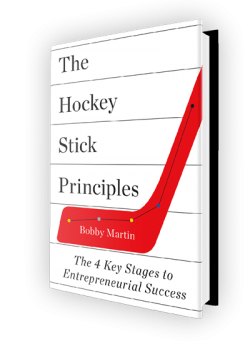The 1979 song “Message in a Bottle,” from The Police, depicts a lonely, despairing man who writes a letter, places it in a bottle, and throws it into the sea, proclaiming he’ll “send an SOS to the world.” Years later, the man, still alone, returns to the beach.
“Walked out this morning,
Don’t believe what I saw—
A hundred billion bottles
Washed up on the shore.
Seems I’m not alone at being alone,
A hundred billion castaways
Looking for a home.”[i]
There are many millions of potential innovative entrepreneurs today who are looking for a home. They are stuck in dead-end jobs, yet hold, like a radiant green-glass bottle, this note in their thoughts: “I desire to build an innovative company, but I can’t overcome the risk and uncertainty of such an undertaking. SOS! What should I do?” If I could send my own message in a bottle to aspiring entrepreneurs, here is what it would say…
Don’t believe for a second that just because you have a job that you’re risk-averse.![]() Click to tweet
Click to tweet
Once your startup business is up and running, you’ll probably have less risk than you would working for a large firm in a tired industry. I can’t tell you how many bankers, software salespeople, programmers, and engineers I know who have lost their jobs right when they least expected it. (Often right when they start earning real money, have three kids to feed, and college coming soon.) But I know a lot of entrepreneurs who have built profitable, valuable, niche lifestyle companies who have less risk than others in traditionally “stable” careers working for “The Man.”
Your chances of success are wayyyy greater than 10 percent.
An often-quoted statistic is that 90 percent of startups fail. I’ve searched and searched for proof of that stat, and it isn’t available. If you have been able to generate significant revenue at costs that are manageable, I believe your chances are greater than 50 percent (or even better if you do things right) to at least build a niche business you can make a solid living at – and greater things could happen.
Don’t put too much pressure on yourself.
Start with one goal in mind: survive and advance.![]() Tweet this When I started my own company, sales research firm First Research, one important resistance to failure was that my partner, Ingo, and I never defined failure. We never discussed whether or not we were failing or meeting goals. For example, we never decided that our $4,000 in sales during the first year was an indication of how we performed. We never talked about when or why we would quit because it wasn’t an option. We were simply successful because we were there and in the game.
Tweet this When I started my own company, sales research firm First Research, one important resistance to failure was that my partner, Ingo, and I never defined failure. We never discussed whether or not we were failing or meeting goals. For example, we never decided that our $4,000 in sales during the first year was an indication of how we performed. We never talked about when or why we would quit because it wasn’t an option. We were simply successful because we were there and in the game.
Start with as little cash and commitment as possible.
When first starting out, you should raise only as much money as you absolutely need to begin testing your idea and then, once you’ve determined to go ahead with building the business, only as much as you need to get to launch. One of the most dangerous misconceptions about starting out is that you can speed it up by pouring cash into attaining scale.
The Startup Genome Report, conducted by entrepreneurs Bjoern Herrmann and Max Marmer in collaboration with Stanford lecturers Steve Blank and Chuck Eesley, researched thousands of Internet startups. One of its findings from an analysis of more than 3,200 firms is that “one reason for failure has shown up again and again: premature scaling.” Better to bootstrap until you figure out how to grow–which sometimes can take years of trial and error. And don’t quit your day job until you have to.
Don’t be afraid of the big bad wolf.
Too many aspiring entrepreneurs have good ideas but are afraid to compete against large established firms. Many big firms have huge cost structures and trip all over themselves. So happy hunting. Here are 3 industries ripe for disruption.
Calibrate the pundits’ advice.
The world of startups is full of pundits–know-it-alls with strong opinions about how things should and shouldn’t be done. (I’m one of them….eeeeeee e.) Many of those strong opinions are delivered mostly to bring attention to themselves. So it’s best to trust your own gut instinct and calibrate all advice based upon the likely biases of that particular pundit.
Balance small failures with small successes.
When I started First Research, I played all these little mind games with myself to feel successful. When I experienced a failure, I would counter that with a small, yet meaningful success. For example, when I called a prospect, and he said, “I just don’t see us ever using this.” Failure. I would pout for a while and then start hunting for good news. I would pull up our website to see if anyone had logged in. I would then email them and receive good feedback. Success. Now I felt successful and could press on.
Teddy Roosevelt said, “It is hard to fail, but it is worse never to have tried to succeed.” Our society puts so much emphasis on winning versus losing. But winning versus losing isn’t what made our country great. We became great by taking risks and innovating–which is far greater than wins and losses. And, as The Police song “Message in Bottle” says, “Only hope can keep us together….” I agree, hope is the greatest strategy of all.
[i] (The Police 1979)
Sign up to get more great insights directly to your inbox.
As a special bonus, you'll also immediately get access to my inside analysis of what made 172 diverse companies achieve take-off revenue growth.

